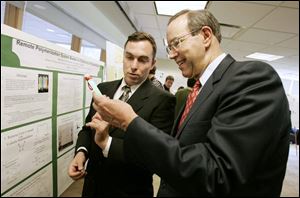
BGSU, UT receive state money for technology, business creation
9/22/2006
Gov. Bob Taft, right, and Andrei Federov, technical director of the Wright Photoscience Lab at Bowling Green State University, examine a commercially available lightstick that affects polymeric coatings. Mr. Taft announced awards to BGSU's photochemical sciences program.
BOWLING GREEN - Gov. Bob Taft yesterday pledged $4.68 million in state funds to supplement research at the state's universities next year, tying the awards to universities allocating matching sums to their targeted research specialties.
"This initiative, along with the state's Third Frontier investments, provides the support necessary for Ohio to continue its international legacy of leadership in innovation," Mr. Taft said during a news conference at Bowling Green State University.
Mr. Taft initiated the 10-year, $1.6 billion Third Frontier project in 2003 to develop technologies and companies with assistance from the state's network of universities.
BGSU will receive $156,987 in fiscal 2007, after being budgeted for $75,799 in "innovation incentives" this year, to research photochemical sciences, which look at the changes light causes in molecules.
Potential applications range from the making of computer chips to developing an odorless wood varnish, said Douglas Neckers, executive director of the university's Center for Photochemical Sciences.
Initiated last June for fiscal 2006, the grants depend on each university annually reallocating 1.5 percent of its state funding for doctoral programs over a 10-year period on a focused research area.
BGSU will allot an extra $231,466 of its doctoral funds to photochemical sciences next year.
The center has 12 faculty members and about 60 PhD students. With the assistance of the state awards, it will add five faculty members during the next two years, Mr. Neckers said.
The University of Toledo will get $242,042 in state funds next year, matching that with $139,825 the university reallocated for alternative energy sources and drug development.
It is slotted to receive $110,828 in grants this year.
The grants are about improving the pipeline of PhD students whose research can result in new companies, said Dr. Jeffrey Gold, UT's provost and executive vice president for health affairs and dean of the college of medicine.
"It is a bit of an experiment," said Dr. Gold, who helped create the program. "But it is conceptually sound. We'll have to see what the next few years bring."